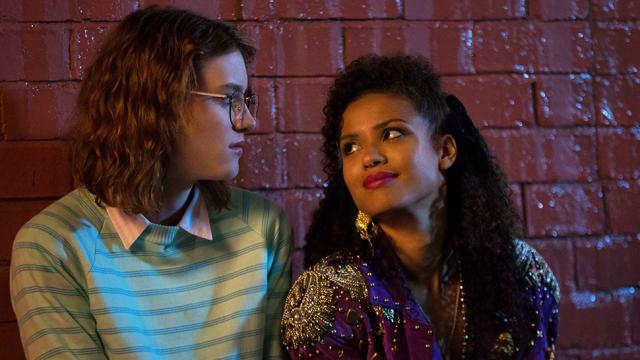Black Mirror is about the twist. That’s not how the show started, but it’s now its hallmark. So any time you watch an episode of the technology-obsessed anthology series, the anticipation that something will almost certainly go wrong at any minute is excruciating. And it’s even worse when the episode is “San Junipero”, and focused on a tender romance unfolding between Yorkie and Kelly.
If you know how Black Mirror operates, it’s clear that the rug is going to be pulled out from under Yorkie and Kelly, and they will end up another notch on the belt of tragedies Black Mirror has woven together. But it turned out “San Junipero” had a very different twist in mind for them, along with a rather prescient message — there’s always, always hope.

Yes, in a rare departure from Black Mirror‘s bleak technophobia and grim dread, “San Junipero” is hopeful. The city itself is just a giant virtual party town spanned across multiple decades, and the denizens are primarily the old, reliving their glory days in youthful virtual bodies before eventually dying or being uploaded to the cloud so they can stay young and party forever. Yet the episode sees this technology not as a necessity deconstructing the bonds of humanity and revealing our baser and most awful selves, but as a lifeline. A salvation for the lost and lonely and broken. And the women at the root of “San Junipero” take the episode further. Their connection, the fundamental queerness of their story, turns the short film into something transcendent.
Yorkie is a lesbian who came out to her parents when she was 21. Whey they took it badly she fled the scene, crashed her car and wound up in a wheelchair for the next 40 years. She’s lost out on everything for the bulk of her life in the real world. No walking in the rain, no dancing in a club and no relationship with another woman. Kelly’s experience was less celibate. She found love and she had a child and she saw the world. Then she lost the child, lost the husband and now she’s realised she’s lived her entire life in the closet.
The two elderly women join the virtual world of San Junipero, each using an avatar of their younger selves. When they first meet online, their connection isn’t electric, it’s more…. right. With excellent performances as the avatars, actresses Gugu Mbatha-Raw and Mackenzie Davis make their romance feel so real it was inevitable. You can’t help but fall in love along with them. You want to see party girl Kelly tethered back to the earth her manic energy threatens to pull her from. You want to see timid Yorkie discovered and embraced. You want each woman to see past the walls they have constructed around themselves.
San Junipero is an escape for both women, but, more substantially, it’s freedom, too. The chance to live openly and proudly like they never could in the real world. We’ve seen plenty of pieces about how the internet and a virtual world provide new opportunities to the disabled, like Yorkie, but less discussed is how it’s also a way for the queer community to interact. A woman in rural Georgia, where the closest gay bar is 300km away, can have access to the same community as a man living on Fire Island.
And that’s not allegory. That’s real. It’s no coincidence that the population of the queer community exploded at the same time internet usage increased. Suddenly isolated women and men had a lifeline to one another, stretched across the web. They could put words to feelings, and define emotions previously unquantifiable.
“San Junipero” took this grain of truth — that saved nearly an entire generation from some of the worst of its confusion — and expanded it into a triumphant story of hope. You can always find that other person who implicitly understands you, and it can never be too late to be with them.
Days like today, when the streets are greasy with filth and rainwater, half a country is reflecting profoundly on the goals of their fellow citizens, and half a world is wondering what happens next, it’s nice to examine the stories that capture us. That bring to light part of ourselves we never thought anyone else knew. The fourth episode of Black Mirror‘s third season does just that. It might be a dead lesbian version of Up, but it’s also a reminder that hope is always there, and it really is never too late.
